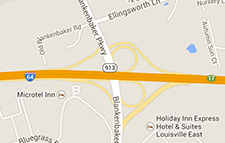Blog
Friday May 3, 2019
The Alternative to Big Law Personal Injury
posted by Jon R. Fee
One cannot watch television, listen to the radio or drive down a Kentucky road without being continually bombarded by advertisements from a handful of law firms trying to catch the attention of personal injury clients. Interestingly, many of these firms are based out of neighboring states or even states hundreds of miles away. Just the other day, I saw an attorney’s giant head on the side of a bus and just below the head was the disclaimer that stated that that attorney was not licensed to practice in Kentucky. One would hope that a potential client would ask, “Why put your face on a bus if you aren’t willing to put in the time to get licensed in this state?”
The answer, unfortunately, likely comes down to money. In Kentucky, a firm can take in a client, sign them up for legal representation and then refer them to another firm in exchange for a referral fee/percentage. This arrangement has created an incredible incentive to advertise. In effect, some law firms have become brokerage houses for potential clients – moving them on to the next firm in exchange for their 15%.
Potential clients should be wary because an extreme interest in advertising is not necessarily reflective of a firm’s interest in seeing a case through to its completion. It is important to inquire with a potential law firm to determine just how frequently they “farm out” cases they are unable to settle in order to get a sense of their commitment to the process and their clients. Additionally, firms that focus on quick settlement or referral, often charge larger contingencies (40%) so they can still find other firms to take the case at 25% after they grab their 15%.
In personal injury cases, there are often factual disagreements and contradicting opinions from experts (sometimes manufactured by the process – sometimes legitimate) that must be put before a jury to ultimately realize the maximum value of a case. Of course, trial in any matter has its risks, but settlement solely to avoid trial should never be a firm’s position. Especially if they are pushing that resolution so that they can move on to the next crop of cases.
An injured person investigating a potential firm should inquire to what degree they, as the client, will be working directly with their attorney. Clients can quickly become frustrated when they realize that their initial contact with the attorney is likely their last as the file gets moved on to a team of paralegals to handle until a settlement can be worked out.
Many advertisements out there talk about getting more money (or tripling the offer), and statistically, on average, attorneys do recover more from insurance companies than individuals handling the case on their own. (a 1999 study by the Insurance Research Counsel) However, the goal should be about getting you back to living your life as you did before your accident. If you start to think about yourself as a number, then you falling into a settlement trap and seeing yourself just as those big firms see you, a number. Is a firm going to try to maximize your recovery? Of course. But the degree to which they are willing to go the extra mile to get additional dollars, is a place where clearing houses struggle. Clients often suffer from a big firm’s cost benefit analysis when they decide whether they should put extra hours into your case or spend those hours talking to 10 other potential clients to get them on the hook. A quick settlement is generally a recipe for failing to fully address the lingering health issues that accompany soft tissue, back and neck injuries. At Barber, Banaszynski & Hiatt, we have a team of Kentucky trial lawyers that spend our time working with our clients rather than doing photo shoots and television ads. The firm has built its reputation through word-of-mouth referrals that only come from satisfied clients. If you have been hurt in an automobile accident or know someone that has been, consider talking with the Kentucky attorneys of Barber, Banaszynski and Hiatt rather than calling an 800 number or speaking with the employee of an out-of-state attorney.
Comments




